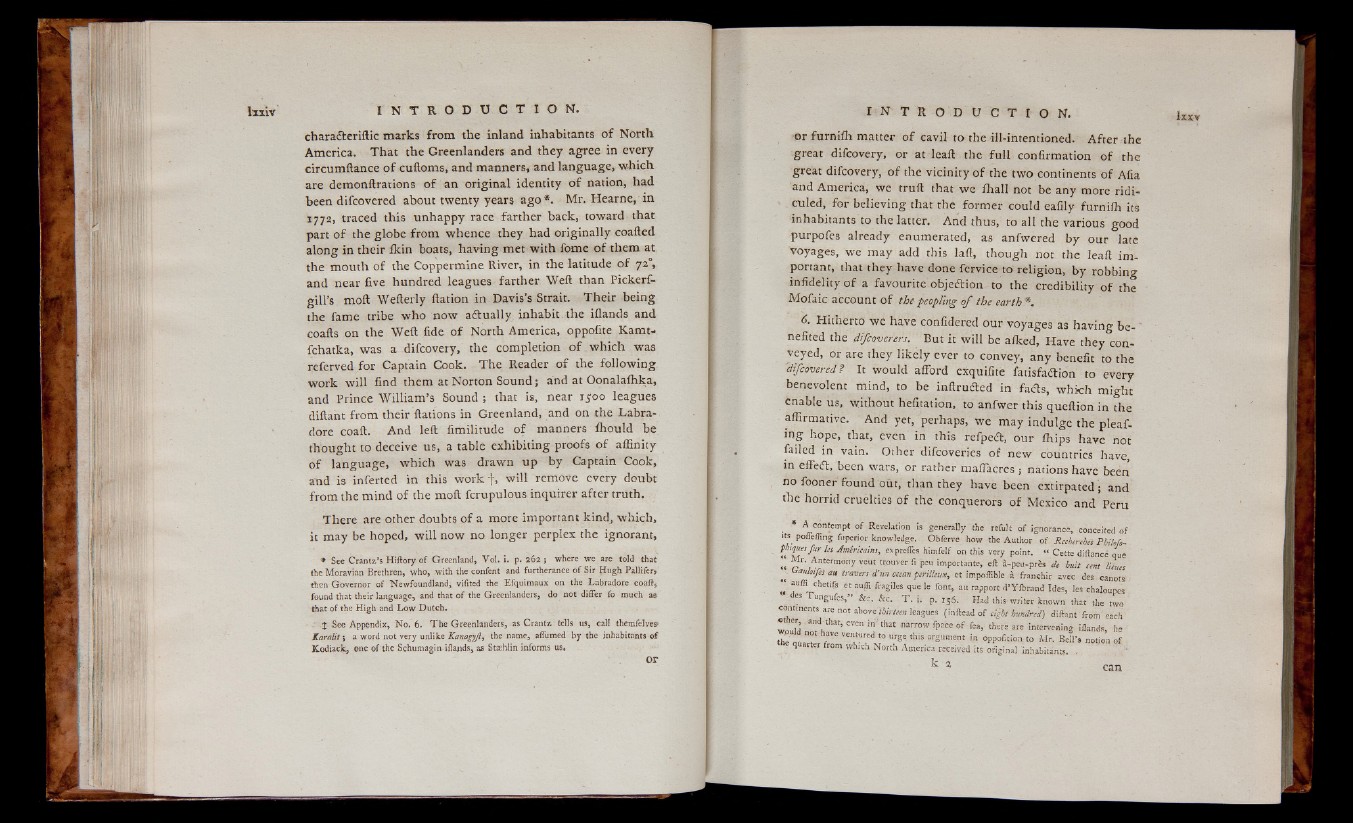
characleriftic marks from the inland inhabitants of North
America. That the Greenlanders and they agree in every
circumftance o f cuftoms, and manners, and language, which
are demonftrations of an original identity of nation, had
been difcovered about twenty years ago*. Mr. Hearne, in
1772, traced this unhappy race farther back, toward that
part of the globe from whence they had originally coafted
along in their ikin boats, having met with fome of them at
the mouth of the Coppermine River, in the latitude of 72°,
and near five hundred leagues farther Weft than Pickerf-
gill’s moft Wefterly ftation in Davis’s Strait. Their being
the fame tribe who now ailually inhabit the iflands and
coafts on the Weft fide of North America, oppofite Kamt-
fchatka, was a difcovery, the completion o f which was
referved for Captain Cook. The Reader of the following
work will find them at Norton Sound; and at Oonalaffika,
and Prince William’s Sound; that is, near 1500 leagues
diftant from their ftations in Greenland, and on the Labra-
dore coaft. And left fimilitude of manners Ihould be
thought to deceive us, a table exhibiting proofs of affinity
of language, which was drawn up by Captain Cook,
and is inferted in this w o rk f, will remove every doubt
from the mind of the moft fcrupulous inquirer after truth.
There are other doubts of a more important kind, which,
it may be hoped, will now no longer perplex the ignorant,
* See Crantz’s Hiftory of Greenland, Vol. i. p. 2625 where we are told that
the Moravian Brethren, who, with the confent and furtherance of Sir JIugh Pallifer»
then Governor of Newfoundland, vifited the Efquimaux on the Labradore coafts
found that their language, and that of the Greenlanders, do not differ fo much a®
that of the High and Low Dutch.
.$■ See Appendix, No. 6. The Greenlanders, as Crantz tells us, call themfelves'
Karalit; a word not very unlike Kanagyji, the name, affumed by the inhabitants o f
Kodiack> one of the Schumagin iflands, as Stsehlin informs us,
or
Or furniffi matter of cavil to the ill-intentioned. After the
great difcovery, or at leaft the full confirmation of the
great difcovery, of the vicinity of the two continents of Afia
and America, we truft that we ihall not be any more ridiculed,
for believing that the former could eafily furniffi its
■inhabitants to the latter. And thus, to all the various good
purpofes already enumerated, as anfwered by our late
voyages, we may add this laft, though not the leaft important,
that they have done fervice to religion, by robbing
infidelity of a favourite objection to the credibility of the
Mofaic account of the peopling of the earth *.
6. Hitherto we have confidered our voyages as having be- '
nefited the difcoverers. But it will be aiked, Have they conveyed,
or are they likely ever to convey, any benefit to the
'difcovered ? It would afford exquifite fatisfailion to every
benevolent mind, to be inftruited in fails, whkh might
enable us, without hefitation, to anfwer this queftion in the
affirmative. And yet, perhaps, we may indulge the pleaf-
ing hope, that, even in this refpedt, our ffiips have not
failed in vain. Other difcoveries of new countries have,
in effeft, been wars, or rather maflacres ; nations have been
no fooner found out, than they have been extirpated ; and
the horrid cruelties of the conquerors of Mexico and Peru
* A contempt of Revelation is generally the refult of ignorance, conceited of
Its poffeiHng fuperior knowledge. Obferve how the Author o f Recherchés Philofe-
t f pees fur tes Américains, exprefles himfelf on this very point. “ Cette diftancé que
<< r ^ ntermonJ' Yeut trouver fi peu importante, eft à-peu-près de huit cent lieues
^ urauloifes au travers d'un ocean périlleux, et impoffible à franchir avec des canots .
" ch« ‘fs et auffi fragiles que le font, au rapport d’Yibrand Ides, les chaloupes
es ungufes,” &c. &c. T . i. p. 156. Had this-writer known that (he two
comments are not ahovn thirteen leàgues (inftead o f ei^ht hundred) diftmt from each
wouTd’ Z l Z T l f i f ™ * nar,oV fPace of-fa*. there are intervening, iflands, he
the' q u a r t e r VC1tU'Ü lî° ” * * 'th|S t i f in oppofition to Mr. Bell’s notion of
rter from which North America received its original inhabitants. .
k 2 can